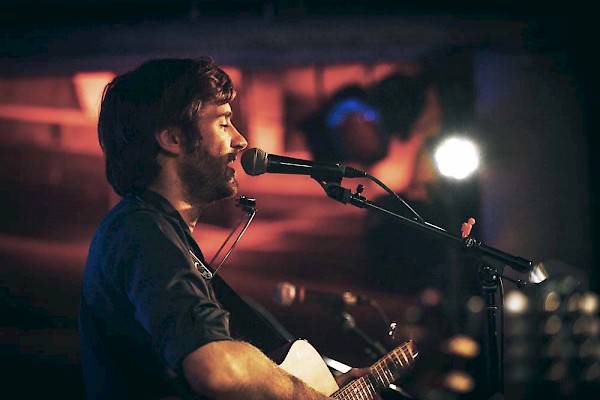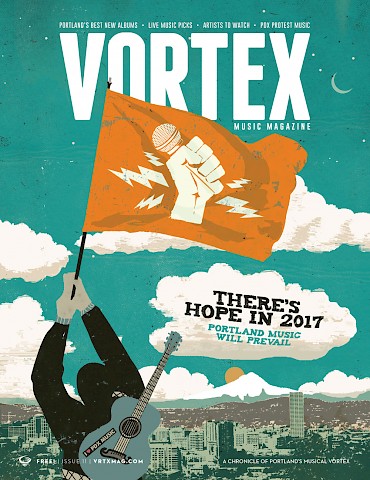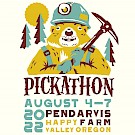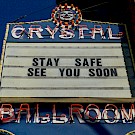 John Craigie celebrated the release of his new record by inviting a whole host of friends to join him on the Doug Fir stage on December 15 where he opened his set with the recently penned “Everything Is Fucked”—listen below and click to see more photos by Jessie McCallI’m not gonna get up here and tell you that things have to get worse before they get better—it just ain’t true,” declared John Craigie in rhythmic talking blues on December 15 at the Doug Fir. “Things could just get better,” he continued, drawing a hearty round of laughter. “And keep getting better… but that ain’t what things usually do.”
John Craigie celebrated the release of his new record by inviting a whole host of friends to join him on the Doug Fir stage on December 15 where he opened his set with the recently penned “Everything Is Fucked”—listen below and click to see more photos by Jessie McCallI’m not gonna get up here and tell you that things have to get worse before they get better—it just ain’t true,” declared John Craigie in rhythmic talking blues on December 15 at the Doug Fir. “Things could just get better,” he continued, drawing a hearty round of laughter. “And keep getting better… but that ain’t what things usually do.”
These poignant, rambling thoughts come from a song written in the days following the election, one with the working title “Everything Is Fucked”—although a fan who recorded Craigie’s performance in San Francisco took the liberty of rechristening it “The Silver Lining of Trump as President” when he posted the only recorded version (so far) on YouTube (watch below).
The irony is not lost on us. In 2008, our first black president ran on a campaign of hope, while in 2016 we received campaigns that lacked visceral emotional connections.
Thing is, we shouldn’t continue to look to politicians for true hope or change. These leaders make promises they can’t possibly follow through on, so why do we repeatedly dupe ourselves into trusting those who so consistently let us down?
As history has demonstrated, change comes from within. It starts at the bottom and moves up, not the other way around. People on the streets and grassroots organizations fire the opening shots, not the nation’s commander in chief or the Supreme Court. It starts with us and that’s why we need to maintain our own hope inside ourselves and within our communities.
And here’s the silver lining according to Craigie—he sings: “It’s historically proven, that when the president is Republican, we have better music. Artists are better when they’re bummed. That’s how it goes, that’s how it’s done. When times are good, musicians, they get lazy…”
“You don’t get a ‘Blowin’ in the Wind,’ you don’t get a ‘four dead in Ohio,’ you don’t get a ‘For What It’s Worth’ without some fucked up shit going down,” Craigie says.
“The cultural ebb and flow that follows the two-party political pendulum swing has historically made for fertile creative soil,” describes Nicholas Harris of Soul’d Out Productions. “Struggle can breed solidarity and solidarity is what movements are made of. Popular forms of music can serve as a barometer for social engagement or awareness.”
 Click to get back to reading the current issue! Cover illustration by Showdeer.“Don’t let the darkness break you, my friend,” Craigie sings. “There are so many of us, and only one of him.” Regardless of your political orientation, there’s truth to this notion. We all know there is power in numbers. This is where real social change happens.
Click to get back to reading the current issue! Cover illustration by Showdeer.“Don’t let the darkness break you, my friend,” Craigie sings. “There are so many of us, and only one of him.” Regardless of your political orientation, there’s truth to this notion. We all know there is power in numbers. This is where real social change happens.
“Live music is one of the last relatively pure forms of communal engagement we have left with each other,” Harris continues. “A lot can be gleaned from seeing which shows people are really wanting to go to, relative to the outlook of the society as a whole—and whether they want escapism, a pressure release, cultural education, or some combo. But, as always, it is up to the artists to lead the way. Not just in reacting to contemporary political issues, but in anticipating solutions.”
“As a folk singer, that’s your job: Be in touch with the community, know what they’re feeling and try to put those feelings into words,” Craigie tells us. “The purpose of music is not to make people feel better; it’s to make them feel not alone.”
It’s on us—not our elected officials. It’s time to unite around the art, causes and movements that make us feel whole, the ones that are pushing the envelope creatively and socially, the ones that are focused on progress—only that will lead to change.
Chris Young Editor-In-Chief








